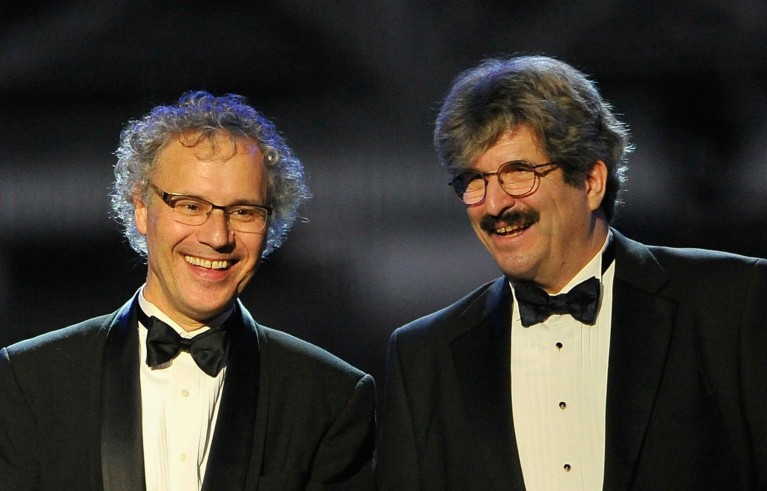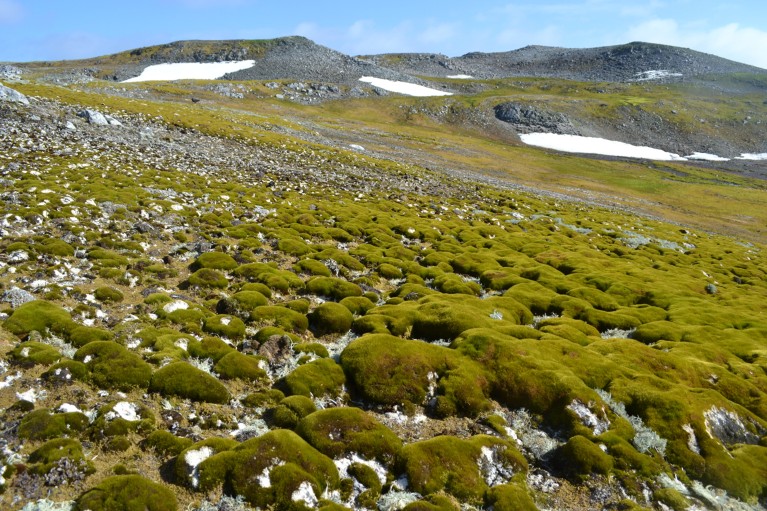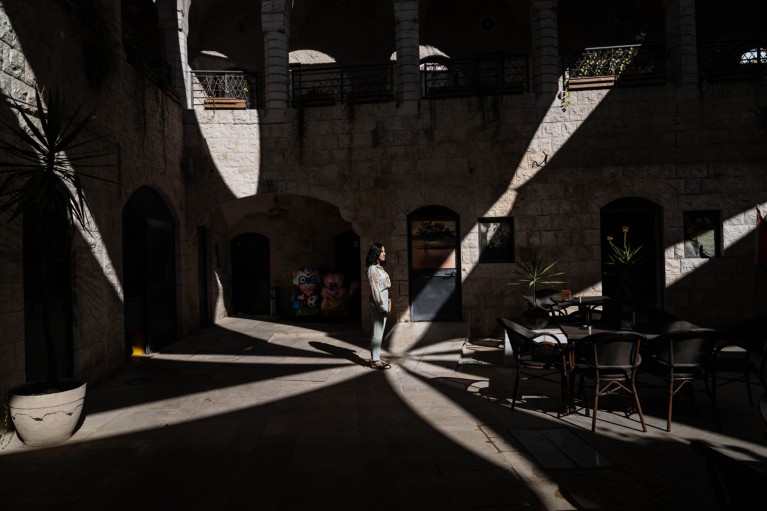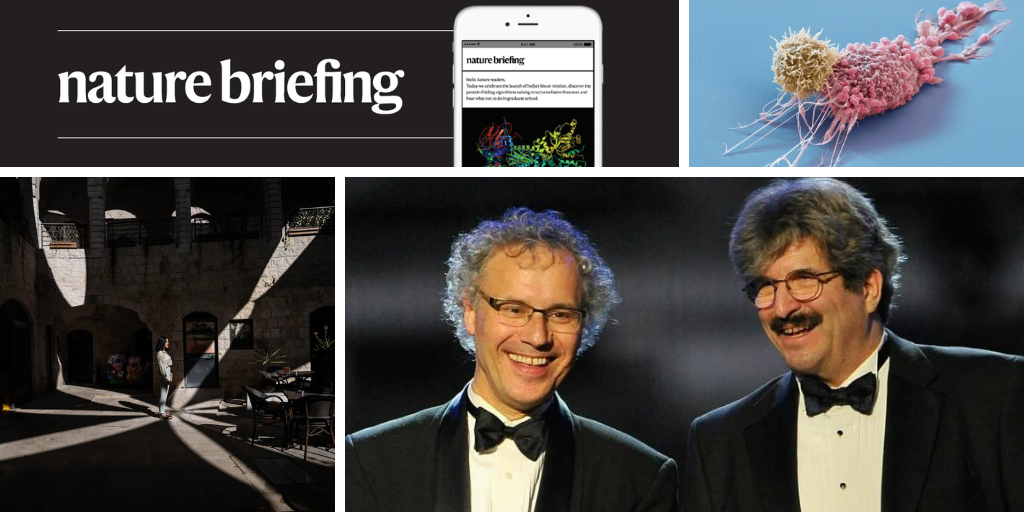Hello Nature readers, would you like to get this Briefing in your inbox free every day? Sign up here.

Victor Ambros (left) and Gary Ruvkun (right) discovered microRNA, a type of molecule that helps to regulate gene activity in our cells. Credit: Steve Jennings/Getty for Breakthrough Prize
The 2024 Nobel Prize in Physiology or Medicine has been awarded to geneticists Victor Ambros and Gary Ruvkun for the discovery of microRNAs, a class of tiny RNA molecules that help to control how genes are expressed in multicellular organisms. (miRNA is not to be confused with messenger RNA (mRNA), which became a household name because of its application to vaccines against COVID-19 and won a Nobel prize last year.) In the 1990s, the laureates identified genes that encoded microRNAs in the roundworm, Caenorhabditis elegans. For years, the discovery was viewed as a quirk unique to roundworms, with little relevance to other organisms. The discovery that microRNAs are conserved across the tree of life caused the field to explode. “That was a watershed moment where everybody realised ‘oh my god’ we missed this whole layer of gene regulation completely,” says RNA biologist Eric Miska.
Reference: Cell paper 1 & Cell paper 2 (both from 1993)
Three people with severe autoimmune diseases are in remission after being treated with bioengineered and CRISPR-modified immune cells called chimeric antigen receptor (CAR) T cells. They are the first to be treated with engineered immune cells from donors. The advance could represent the first step towards mass production of CAR T therapies for conditions such as lupus and multiple sclerosis. The ongoing success and safety of the therapy need to be demonstrated in more people before it can be considered for wider use, but it “could prove paradigm shifting”, says immunologist Daniel Baker.
Reference: Cell paper
A key region of Antarctica is getting greener with alarming speed — a trend that will spur rapid change of Antarctic ecosystems. Researchers looked at satellite imagery of one of the continent’s fastest-warming regions: the Antarctic Peninsula, which juts north towards the tip of South America. They found that the area covered by plants increased by almost 14 times between 1986 and 2021. “It’s the beginning of dramatic transformation,” says remote-sensing specialist and study co-author Olly Bartlett.
Reference: Nature Geoscience paper

Hummocks of moss cover Ardley Island off the tip of the Antarctic Peninsula.Credit: Dan Charman
As mosses — like these on Ardley Island — spread to previously ice-covered regions, they will build up a layer of soil, potentially offering a habitat for invasive species.
Features & opinion

Computer scientist Mona Nabil Demaidi works with Palestinian students and insists that “there is a future” for academia in Gaza, despite the destruction.Credit: Samar Hazboun
A year on from the 7 October attacks by Hamas on Israel, and the start of the war in Gaza, scientists on both sides of the border are searching for ways forward. Many are facing the devastation of losing livelihoods, homes, loved ones and colleagues. All 19 universities and community colleges in Gaza have been destroyed or damaged. “The loss of talent enrages and saddens me so much,” says an anonymous environmental scientist in Israel, who is working to help two Gaza master’s students to flee. “I know what these kids would [accomplish] if there were different circumstances.”
As the ages of US presidents and presidential contenders edge upwards, it’s an apt time for former White House physician Jeffrey Kuhlman to weigh in, writes medical student Henna Hundal. In his new book, Transforming Presidential Healthcare, Kuhlman explores, among other things, how research findings on ageing and neurocognition could inform whether a future president is deemed unfit to serve. The book is “riveting”, writes Hundal, as it reveals “the ethical and practical considerations at play for a physician who finds himself serving the ‘leader of the free world’”.
Some areas of psychology are embracing citizen science — involving people who aren’t scientists in the design and conduct of research — but it’s underutilized in cognitive science, argue four psychologists. It is challenging for people to be both researchers and participants, because knowledge of the study might bias the results. And there are ethical complexities to citizens’ accessing sensitive data. But the effort is worth it. “It can help scientists to define societally important research questions about cognition and behaviour in daily life that they perhaps had not even thought of,” write the authors.
On Friday, Leif Penguinson was buzzing around near Bee Falls in Madhya Pradesh, India. Did you find the penguin? When you’re ready, here’s the answer.
Thanks for reading,
Flora Graham, senior editor, Nature Briefing
With contributions by Jacob Smith
Want more? Sign up to our other free Nature Briefing newsletters:
• Nature Briefing: Careers — insights, advice and award-winning journalism to help you optimize your working life
• Nature Briefing: Microbiology — the most abundant living entities on our planet — microorganisms — and the role they play in health, the environment and food systems.
• Nature Briefing: Anthropocene — climate change, biodiversity, sustainability and geoengineering
• Nature Briefing: AI & Robotics — 100% written by humans, of course
• Nature Briefing: Cancer — a weekly newsletter written with cancer researchers in mind
• Nature Briefing: Translational Research — covers biotechnology, drug discovery and pharma


